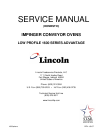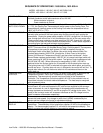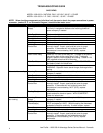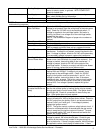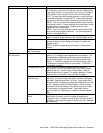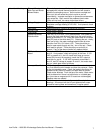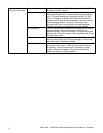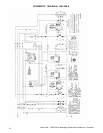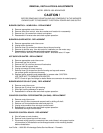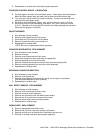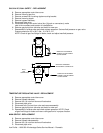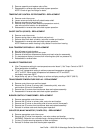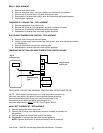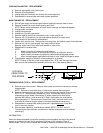
Low Profile – 1600-000-A Advantage Series Service Manual – Domestic
7
Intermittent Heating Thermal/Overload of
Main Fan and Burner
Blower Motors
The main fan motors and the burner blower motors are
equipped with internal thermal protection and will cease to
operate if overheating occurs. As the motors overheat and
then cool, this will cause the units to cycle on and off
intermittently. Improper ventilation or preventive maintenance
may cause this. Also, most of the problems listed under
"Oven will not heat" can cause intermittent failure.
Voltage Supply Check incoming voltage supply at line 1 to neutral. There
should be a voltage reading of 120 VAC. If not present, check
breakers.
Fan Switch See procedure for checking at beginning of section.
Conveyor will not run
10 Amp Fuse Check and/or replace.
Fuse holder Check and/or replace.
Speed Adjustment
Potentiometer
This is a 0 to 10 K ohm, 1 turn potentiometer. With power off,
remove the black and white pot leads from the motor control
board at terminals P1, P2. Place the meter leads on the black
lead (P2) and on the white lead (P1). Rotating the pot., slowly,
from low to high, the meter readings should show an even
transition from 0 to 10 K ohms ± 5%. There should be no
dead or open spots through out the 1 turn of the pot. Check
both leads to ground. There should be no continuity to
ground. If any of the above checks fail, replace the pot
DC Motor Control
Board
Check for 120 VAC input to the control board at terminals L1
and L2. If not present, check wiring back to the fuse. If 120
VAC is present at L1 and L2, check both fuses on control
board (8A line and 1A armature), check the VDC output at
terminals A+ and A-. If 120 VAC is present at terminals L1
and L2, and DC voltage is present A+ and A-, but motor does
not run, check gear motor as follows.
Conveyor Gear Motor If DC voltage is present at A+ and A- and the motor does not
run, first check the mini breaker and then the conveyor. Refer
to the next possible cause. Check the leads to the motor for
evidence of any shorts or opens, and each lead to ground.
Check motor brushes. From the top of the motor, rotate motor
shaft to determine if there is a locked rotor or a locked gear
box (use care so magnet and H.S. board are not damaged).
Replace motor as needed.
Conveyor Check for any mechanical misalignment. Also, check for worn
bearings. A conveyor belt that is over tightened will cause
excessive bearing wear and sometimes, irregular speed.



